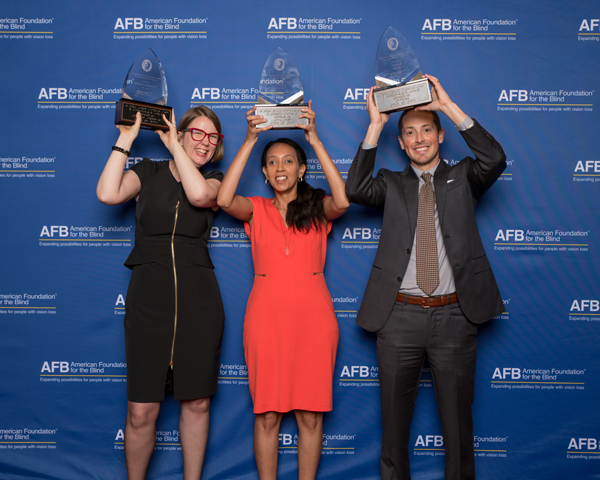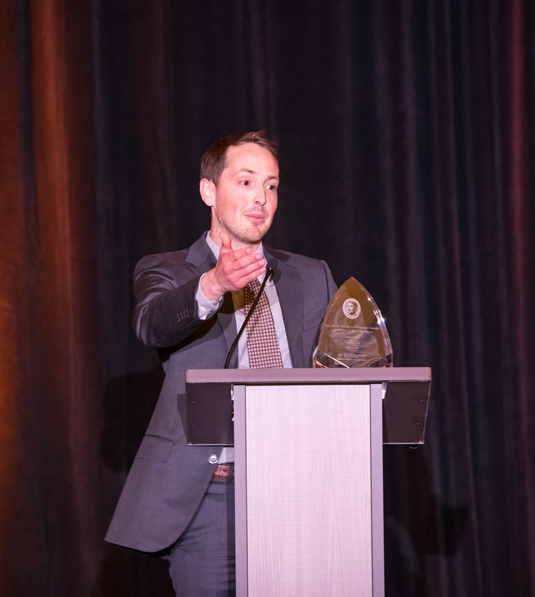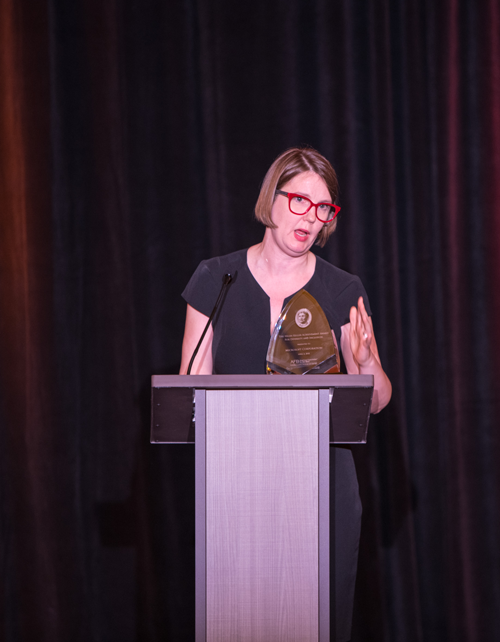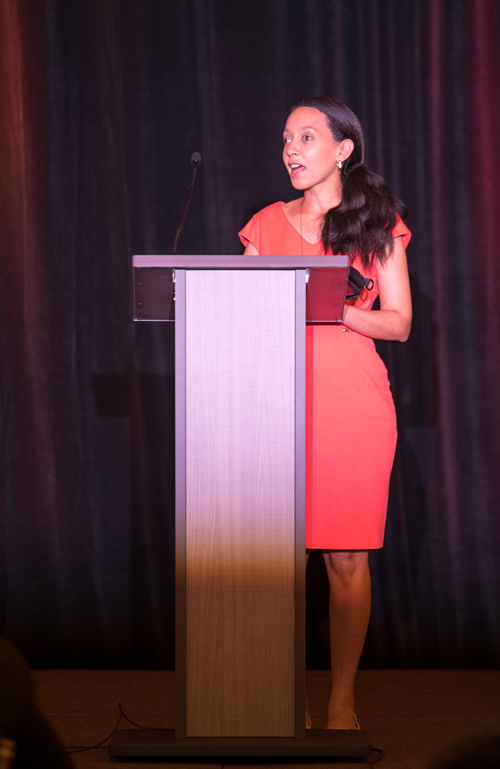On Thursday April 4, 2018 AFB presented the Helen Keller Achievement Awards (HKAA) to three very impressive recipients. The awardees were Facebook and Microsoft, for their exemplary roles in creating accessible products or improving the accessibility of their already-popular products; and Haben Girma, for her advocacy and dedication to creating equal opportunities for people with disabilities. This is the first time AFB held this prestigious gala on the eve of the annual AFB Leadership Conference.
"This year's recipients capture the spirit of Helen Keller's belief in the power of effecting social change," said Kirk Adams, AFB president and CEO. "All of the awardees are making a dramatic difference in the lives of people with disabilities, and we are thrilled to recognize their accomplishments." After some good-natured banter from Kirk and a shout-out to the HKAA sponsors who made evening possible, the evening got underway.
AFB Trustee Member Susan Weidle and Google Patent Attorney Jack Chen gave a warm welcome and introduced the first honoree of the evening, Facebook. Accepting the award on behalf of Facebook was Jeffrey Wieland, Director of Accessibility.
"I want to thank Kirk and AFB for this, Wieland said. “It's truly a honor to be up here alongside Microsoft and Haben. It's very humbling and it's very special moment for us... I also want to thank my team, who is here, table 17. Everybody at table 17 comes to work every day, and thinks about how to build more assistive technologies, and how to connect everybody in the world. And that is the mission of this team. So I'm very thankful and fortunate to work with such a team.
"While this award is a huge moment for Facebook and for us who are are committed to accessibility and driving changes through progress, it's really that partnership with AFB that has meant so much over the past couple years. And I think that the concept of accessibility means a journey, and not a destination. I am really thankful for having AFB on that journey with us. Looking out, what I can say is that I'm hopeful that AFB continues to be a part of that journey with us, and I'm looking forward to the many miles we still have on that road."
After a few moments of applause from the audience, Megan Dodd, Director of AFB's Center on Vision Loss, and Executive Vice President of Human Resources for Hewlett Packard Enterprise, Alan May—he's also on AFB's Board of Trustees—presented the next award to Microsoft. Representing Microsoft was Jenny Lay-Flurrie, chief accessibility officer for the company. Jenny started off by saying, "I am incredibly humbled to be here, the enormous gratitude I have for AFB, Kirk, and Russell (Shaffer) and the rest of the board and the team here, just amazing work."
Jenny went on to say, "We (Microsoft) had this massive opportunity to live into the mission, which changed a few years ago when our new CEO came in and changed to be empowering for every person, and every organization, to achieve more, including us cool, incredible, and kick-ass people with disabilities."
"The suite of products that we're working on really do go from gaming to office to Windows to hacking—hacking is a good thing! All of it should be accessible."
Referring to an in-house hacking marathon—a hack-a-thon, if you will— Jenny explained, "When we started hacking four years ago, I had ten projects and 75 people working on disability hacks. Last year I had 150 projects and 800 people hacking for disabilities."
She concluded by saying, "The focus is real but there's a lot more to do. So please, keep us grounded. Keep us honest. Know that your feedback is golden. And we want it. And every one of those people from those projects and those groups...I just want to say a huge, enormous thank you, and keep it coming!"
The last, but most certainly not the least, on the roster to receive an HKAA award was Haben Girma. As her award was handed to her, Haben exclaimed, "It has braille on it! This is amazing. This is the first time I've felt one of these with braille on it—thank you, AFB! And the rumors are right—it is really heavy!"
She then went on to tell the audience a little about herself, "As you've heard throughout the evening, I am deafblind, and the way I communicate is, I use a digital braille display, up here on the podium now. And I have an interpreter who is typing on a keyboard that connects here. Usually when people meet me, the first thing they ask is, how do you communicate?
"The second thing they usually ask is, have you heard of Helen Keller?"
"Yes, actually," Haben continued. "She's an incredible advocate. She advocated for women's rights, racial equality, disability rights. Disability is not a barrier. When communities choose to be inclusive, then we all have access. When Helen Keller was looking for a college to attend, Harvard wouldn't admit her. Back then, Harvard only valued men. Helen's disability didn't hold her back. Her gender didn't hold her back. It was the community of Harvard that chose the path of exclusion.
We've come a long way as a society since those times. Harvard has since made the smart decision to open its doors to women, people of color, and people with disabilities.
We still have more barriers we need to remove. And it's up to all of us to choose whether we are going to accept unfairness, or advocate for inclusion. People with disabilities are the largest minority group: over 1.3 million people worldwide. This is a significant community. And all of our bodies change. We deserve access at every stage of our lives. I have devoted my time, my career, helping to make the world more inclusive, helping organizations from schools to tech companies to make services and programs more accessible. And I hope all of you here will choose to join me in making our world more accessible."
AFB would like to thank all of you who attended the awards gala. More information on this annual event and award recipients—both present and past—can be found on our Helen Keller Achievement Awards page.



